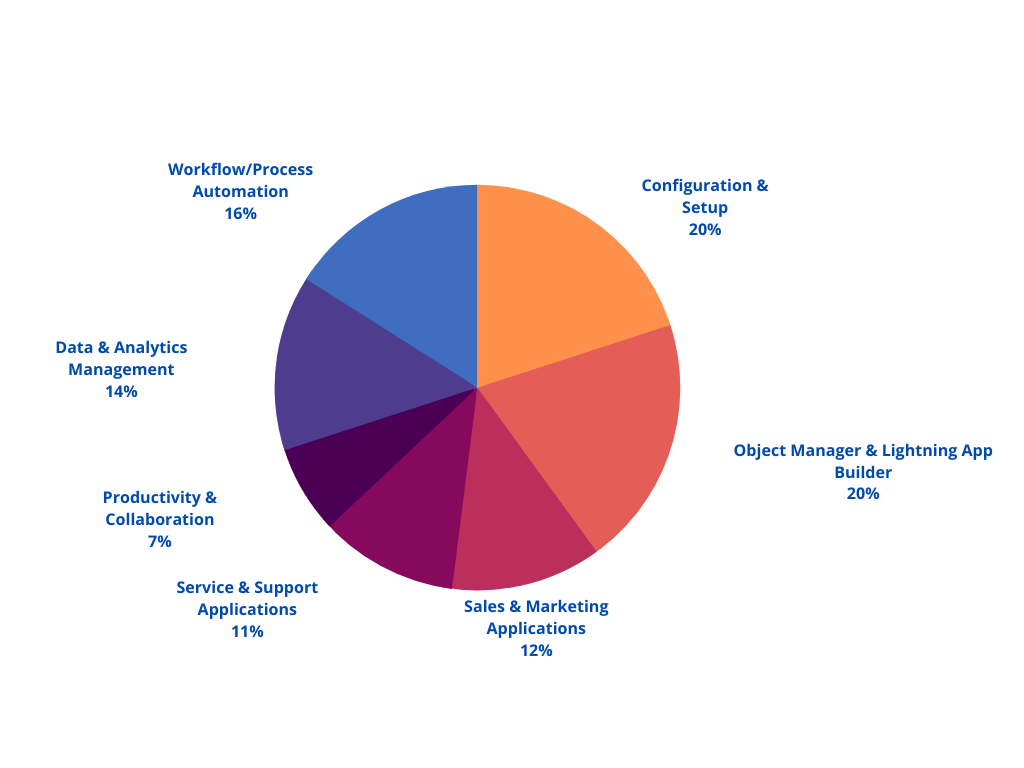Salesforce Admin 201 Certification Exam Syllabus 2023
Students who are preparing for salesforce admin 201 certification exam must know the syllabus to pass the exam with flying colors, Please check the official salesforce admin 2o1 certification exam syllabus 2023 topics from which the question is going to be asked and prepare for the exam accordingly
Download salesforce admin syllabus PDF
check the list of Salesforce Admin topics and subtopics 
- Configuration & Setup
- Object Manager & Lightning App Builder
- Sales & Marketing Applications
- Service & Support Applications
- Productivity & Collaboration
- Data & Analytics Management
- Workflow/Process Automation
1. Configuration & Setup: 20%
- Describe the information found in the company settings (For example: company settings fiscal year, business hours, currency management, default settings).
- Distinguish and understand the administration of declarative configuration of the User Interface. (For example UI settings, app menu, list views, global actions, Lightning App Builder).
- Given a scenario, demonstrate the proper setup and maintenance of users.
- Explain the various organization Security Controls. (For example Setup Audit Trail, Login Hours, Session Settings)
- Given a user request scenario, apply the appropriate security controls based on the features and capabilities of the Salesforce sharing model. (For example public groups, org wide default, sharing: roles, subordinates, hierarchy, report and dashboard folders).
- Given a scenario, determine the appropriate use of a custom profile or permission set using the various profile settings and permissions.
2. Object Manager & Lightning App Builder: 20%
- Describe the standard object architecture and relationship model. (For example: standard object, parent/child, master detail/lookup/junction relationships, and record types.)
- Explain how to create, delete, and customize fields and page layouts on standard and custom objects, and know the implications of deleting fields.
- Given a scenario, determine how to create and assign page layouts, record types, and business processes for custom and standard objects.
3. Sales & Marketing Applications: 12%
- Given a scenario, identify the capabilities and implications of the sales process. (For example: sales process, opportunity, path, and forecast impact.)
- Given a scenario, apply the appropriate sales productivity features using opportunity tools. (For example: dashboards, lead scoring, Einstein opportunity scoring, and home page assistant.)
- Describe the capabilities of lead automation tools and campaign management. (For example: leads, lead convert, lead assignment rules, campaign and campaign members.)
4. Service & Support Applications: 11%
- Describe the capabilities of case management. (For example: case, case assignment rules, and queues.)
- Given a scenario, identify how to automate case management. (For example: support process, case auto-response rules, and case escalation.)
5. Productivity & Collaboration: 7%
- Describe the capabilities of activity management.
- Describe the features of Chatter.
- Describe the capabilities of Salesforce Mobile App.
- Identify use cases for AppExchange applications.
6. Data & Analytics Management: 14%
- Describe the considerations when importing, updating, transferring, mass deleting, exporting and backing up data.
- Describe the capabilities and implications of data validation tools.
- Describe the options available when creating or customizing a report or report type.
- Describe the impact of the sharing model on reports.
- Describe the options available when creating and modifying dashboards (e.g., dashboard components, data sources, chart types, Subscribing, running user).
7. Workflow/Process Automation: 16%
- Given a scenario, identify the appropriate automation solution based on the capabilities of the tool.
- Describe capabilities and use cases for Flow.
- Describe capabilities and use cases for the approval process.
To prepare for the salesforce admin certification exam please check the guide on trailhead

